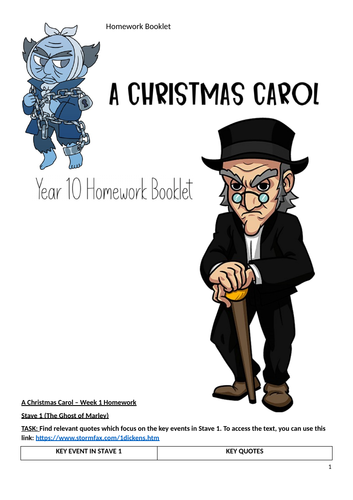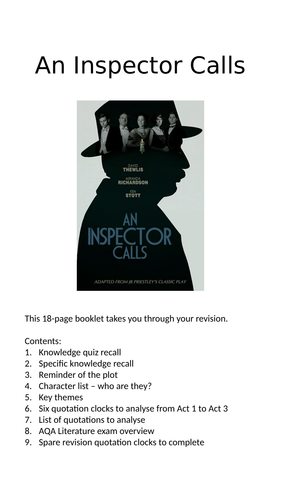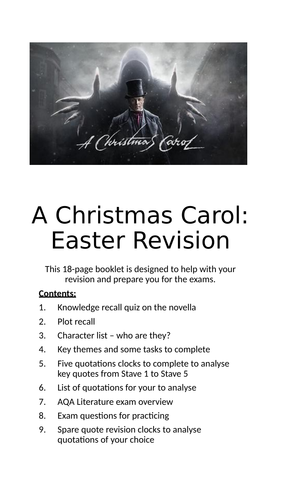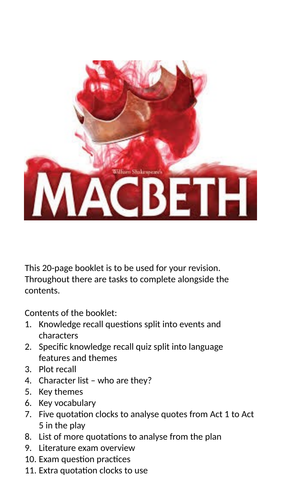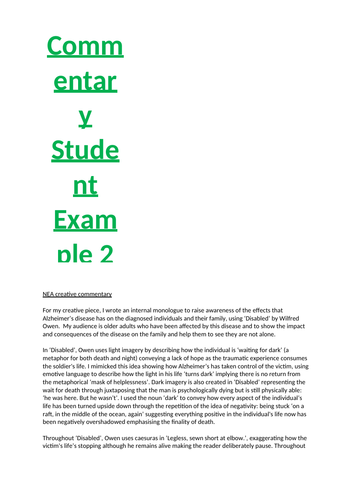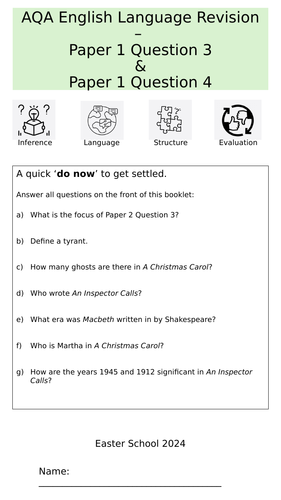
29Uploads
2k+Views
1k+Downloads
All resources

The Laboratory x3 Lessons Crime Poetry A Level English Literature
This contains 3 lessons for The Laboratory with integrated context, analysis and tasks for students to complete when teaching The Laboratory. I have also included a copy of the annotated poem to assist the teaching of this poem.
The three lessons will last 3 hours and when annotating the poem, this should be done under a visualiser. The tasks for students could be set as independent study time or homework, and will assist the further learning of the course.

A Christmas Carol Homework Booklet Year 10
A 6 week homework booklet designed for recalling what had been covered in lesson. At no point was this put together to necessarily challenge but more to reiterate and strengthen what had been studied from tasks and the novella.
I found it useful and students learnt and recapped ideas easier which then assisted the learning within lesson. Great for going through under a visualiser and peer assessing answers, and for stengthening speaking and listening.

An Inspector Calls Revision School 18 Page Booklet
This 18-page booklet takes Key Stage 4 pupils through revision. It contains the below and there are activities on each page to complete. This can be used under a visualiser, for Easter revision at home or alongside lessons before the exam.
Contents:
Knowledge quiz recall
Specific knowledge recall quiz
Reminder of the plot
Character list – who are they?
Key themes to run through
Six quotation clocks to analyse from Act 1 to Act 3
List of quotations to analyse
AQA Literature exam overview
Spare revision quotation clocks to complete

A Christmas Carol Revision School Booklet 18 Pages
A Christmas Carol Revision Easter School Booklet
Can be used for all year round. This 18-page booklet is designed to help with your revision and prepare you for the exams.
Contents:
Knowledge recall quiz on the novella
Plot recall
Character list – who are they?
Key themes and some tasks to complete
Five quotations clocks to complete to analyse key quotes from Stave 1 to Stave 5
List of quotations for your to analyse
AQA Literature exam overview
Exam questions for practicing
Spare quote revision clocks to analyse quotations of your choice

Macbeth Revision School 20 Page Booklet
This 20-page booklet is to be used for your revision. Throughout there are tasks to complete alongside the contents.
Contents of the booklet:
Knowledge recall questions split into events and characters
Specific knowledge recall quiz split into language features and themes
Plot recall
Character list – who are they?
Key themes
Key vocabulary
Five quotation clocks to analyse quotes from Act 1 to Act 5 in the play
List of more quotations to analyse from the plan
Literature exam overview
Exam question practices
Extra quotation clocks to use

AQA A Level English Language NEA Commentary Lesson
This lesson is designed to assist A Level English Language students on preparing to write their commentary element for their coursework. The PPT should be introduced over two lessons and have examples of a commentary attached to it (I have included two examples from my students from previous years).
The lesson should be printed (certain slides should be) for the students to follow and assist their own levels of analysis.
To plan, get the students to have a look at the language levels that link together then create paragraphs analysing them referencing the style model as they go.
My biggest tip would be to get students to write paragraphs based on the language levels first, and then see if they can piece together the essay with those paragraphs. My students seem to discuss the style model too much to begin with, rather than analysing their own work referencing the style models.
Hope this helps!

Chapters 23-27 The Murder of Roger Ackroyd Narrative Structure and Plot
Here we have two lessons in one powerpoint exploring the narrative plot and framing devices that Christie uses. There are slides with tasks on and other slides for students to take notes from. I have also included a document which is like a transcript for the lesson going through the information minus the tasks.
The lesson should take two lessons and it is the students considering Christie’s authorial methods whilst also understanding the ending. It is the assumption that students have already read the whole novel.
It is going over set-piece ending, framing devices and back to focalisation.
Hopefully this will help when teaching.

Paper 1 Question 3 and Question 4 Revision Year 11 English Language
This is a booklet using The Handmaid’s Tale focusing on question 3 structure and question 4 evaluation revision for Year 11. It’s designed for a set 2 and a set 3 in mind.
There are bits of advice, flipped learning questions, analysis of questions (to be done under the visualiser), mark schemes for those questions and model answers that can be adapted and then carried on.

AQA Crime Poetry Peter Grimes by George Crabbe A Level 8 Lessons
Here are 8 lessons on Peter Grimes for A Level (annotating will have taken place within these lessons as well). There are a range of PowerPoint slides and worksheets to be completed (either in class, independent study or homework). The lessons focus on lines 1 - 153 with having looked at and annotated lines 1 - 200 in terms of annotating.
When teaching this poem for the first time, I found that if I concentrated and took it slowly up to line 153, the class could then feel confident about continuing their own annotations in small groups/pairs and then feeding back to one another.


